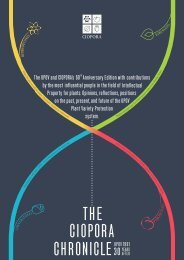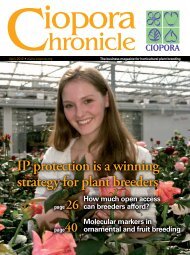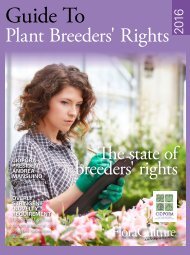2014 CIOPORA Chronicle
CIOPORA annual magazine on Intellectual Property protection for plant innovations 2014. Produced in cooperation with FloraCulture International. Read in the 2014 issue: - Innovation bridges gap between tradition and future - Challenges of modern horticulture - IP Solutions for the Future: Creative Barcode - ‘Mission FUTURE’: CIOPORA’s position papers on IP - Enforcement reform: an Australian story - Trademarks and variety denominations - harmonization underway? and more...
CIOPORA annual magazine on Intellectual Property protection for plant innovations 2014. Produced in cooperation with FloraCulture International.
Read in the 2014 issue:
- Innovation bridges gap between tradition and future
- Challenges of modern horticulture
- IP Solutions for the Future: Creative Barcode
- ‘Mission FUTURE’: CIOPORA’s position papers on IP
- Enforcement reform: an Australian story
- Trademarks and variety denominations - harmonization underway?
and more...
Create successful ePaper yourself
Turn your PDF publications into a flip-book with our unique Google optimized e-Paper software.
Opinion<br />
Understanding the implications<br />
of the Global Village<br />
Photo credits: Frank Bonnet<br />
Flowers, once seen as a seasonal<br />
product in European markets,<br />
have become an all year round<br />
commoditised product. It is<br />
nowadays standard to harvest a<br />
rose in Kenya today and for it to<br />
be delivered through a complex<br />
logistical network to a customer’s<br />
home almost anywhere in the<br />
world within 24 hours.<br />
The floriculture industry, populated<br />
by a diverse range of businesses<br />
contributing to the overall supply<br />
chain (from breeders, propagators<br />
and growers to shippers, whole<br />
salers, distributors, retailers and<br />
florists), today faces increasing horizontal<br />
and vertical competition in<br />
every part of its value chain due to<br />
globalisation. In particular, the industry<br />
has seen a shift of production<br />
from the developed countries and<br />
the entry of developing countries<br />
into a global trading system over<br />
the past 20 years, resulting in<br />
increasingly interdependent<br />
economies from a macro-economic<br />
perspective. This process has been<br />
accelerated by the rapid development<br />
of and access to international<br />
communications, technology,<br />
freight logistics and marketing. The<br />
recent global recession has further<br />
prompted demand for reduced<br />
prices on the floriculture market –<br />
rather than for reduced quantities.<br />
by Herman de Boon<br />
Trends & challenges in the flower value chain<br />
(CBI Centre for the Promotion of Imports from developing countries).<br />
Michael E. Porter<br />
Concepts, such as those proposed<br />
by Professor Michael E. Porter from<br />
Harvard Business School, suggest<br />
that globalisation is driven by the<br />
need of companies and national<br />
governments to maintain their<br />
market share and competitiveness<br />
through adaptive and innovative<br />
business solutions. There is a lot of<br />
evidence of numerous innovative<br />
responses to the globalisation challenges<br />
today in the fields of plant<br />
breeding, greenhouse technology,<br />
energy and water saving systems,<br />
integrated pest management,<br />
post-harvest management, waste<br />
reduction, sea transport, electronic<br />
sales platforms, distribution hubs,<br />
and supply chain optimisation.<br />
Golden triangle models<br />
‘Public – private sector – people’<br />
models are increasingly demonstrating<br />
significant benefits in the<br />
globalisation of the industry. These<br />
developments, alternatively described<br />
as “golden triangle” models,<br />
are characterised by governments<br />
creating an environment that<br />
enables innovation and knowledge<br />
sharing, with industry recognising<br />
that profitability is linked to social,<br />
environmental and financial<br />
risks and civil society adopting a<br />
monitoring role with respect to<br />
compliance and sustainability.<br />
International organisations such as<br />
<strong>CIOPORA</strong> and Union Fleurs also<br />
positively contribute to globalisation<br />
by bringing together industry<br />
players to address supply chain<br />
issues in a coordinated and precompetitive<br />
way and seeking to<br />
optimise the enabling and regulatory<br />
environment for the benefit of<br />
the value-chain. In this way issues<br />
that were traditionally dealt with on<br />
an individual basis are now brought<br />
into an international arena for<br />
discussion and resolution.<br />
Sustainability<br />
These issues are not limited to<br />
the business environment but<br />
also pertain to the social and<br />
environ mental responsibilities<br />
of the floriculture industry.<br />
Globalisation has improved the<br />
access to information and increased<br />
the demand for sustainably<br />
produced goods. To address the<br />
wider concerns of consumers, civil<br />
society and investors about where<br />
the product comes from, how it<br />
is produced, how people producing<br />
it are treated and what are the<br />
environmental and social impact of<br />
its production and do so in an efficient<br />
and responsible manner, the<br />
sector has pro-actively and increasingly<br />
engaged in coordinated and<br />
transparent schemes such as, most<br />
recently, the Floriculture Sustainability<br />
Initiative (FSI), an innovative<br />
pre-competitive multi-stakeholders<br />
platform.<br />
Opportunities<br />
Globalisation of the floriculture<br />
industry has created numerous<br />
challenges but has equally fostered<br />
many opportunities, including<br />
a greater efficiency in the supply<br />
chain and in the use of natural<br />
resources, income and lifestyle<br />
enhancement in developing<br />
economies, and increased choice<br />
and competitively priced products<br />
for consumers. The entrepreneurial<br />
and innovative capabilities of all industry<br />
players across the floriculture<br />
value-chain will determine how<br />
they are going to meet the challenges<br />
and remain profitable in an<br />
ever increasingly competitive and<br />
global business environment. |||<br />
About the author<br />
Ir. ing. Herman de Boon is president<br />
of Union Fleurs, the International<br />
Flower Trade Association,<br />
since <strong>2014</strong> and chairman of VGB<br />
(Vereniging van Groothandelaren<br />
in Bloemkwekerijproducten),<br />
the Dutch association for the<br />
wholesale trade in flowers and<br />
plants, since 2002.<br />
14 www.FloraCulture.eu | <strong>CIOPORA</strong> <strong>Chronicle</strong> June <strong>2014</strong>









